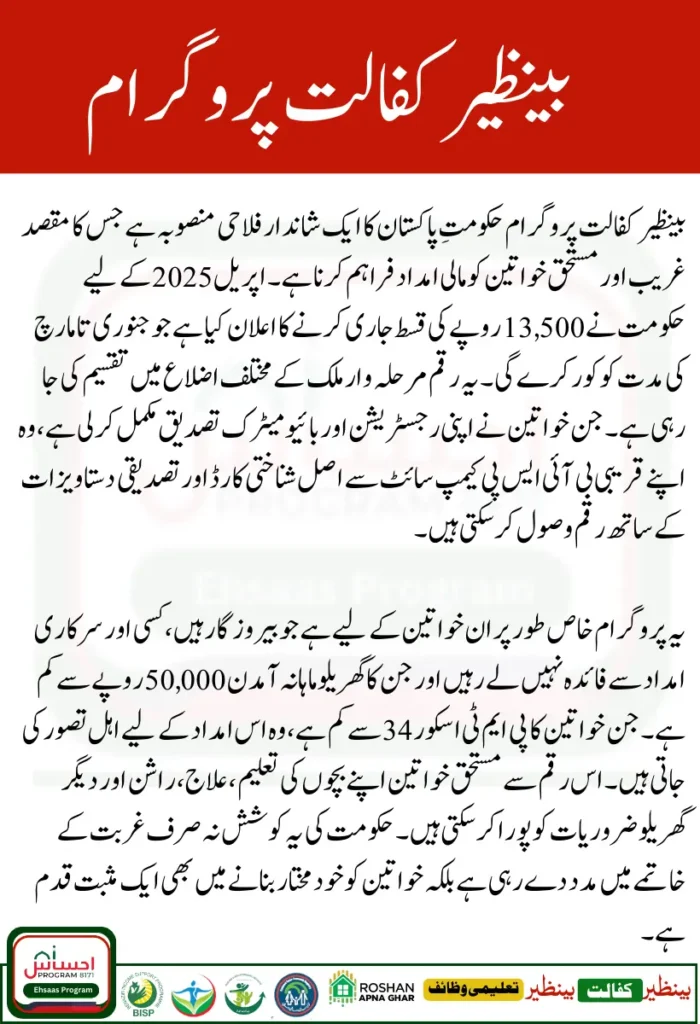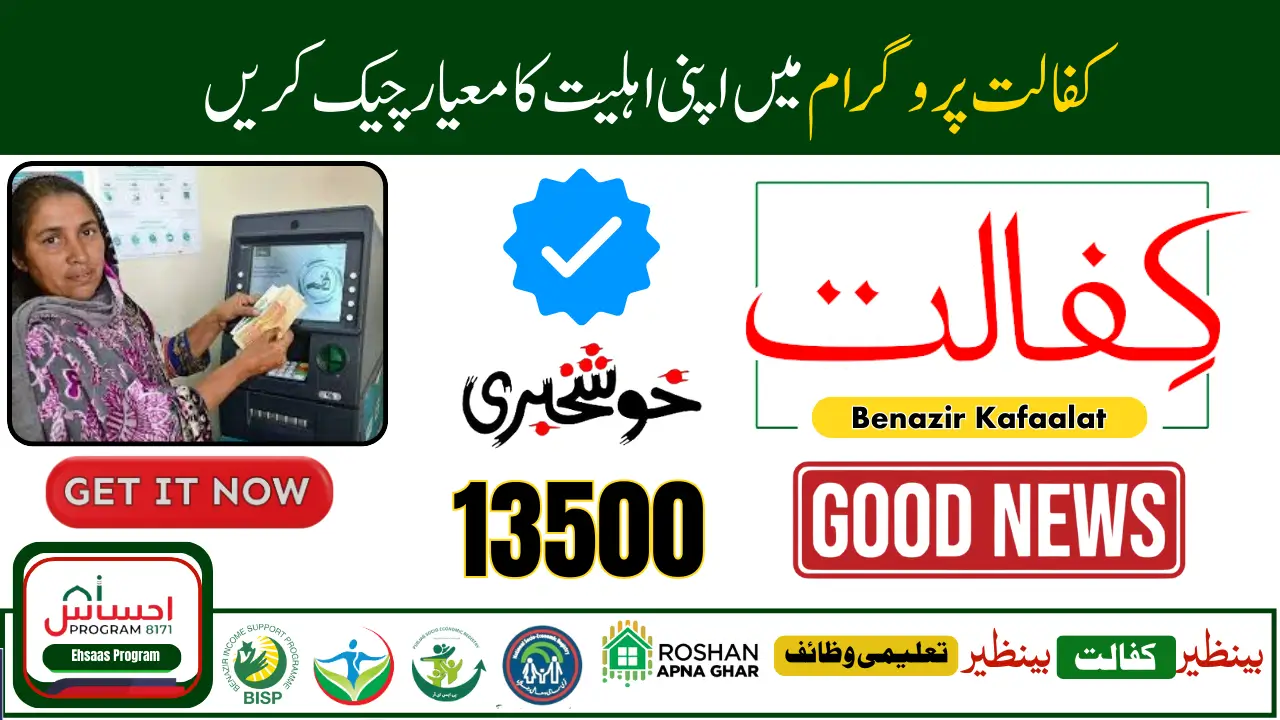Benazir Kafalat Program Payment Update remains one of Pakistan’s largest and most vital social safety nets. Designed specifically to support underprivileged families particularly women this initiative continues to provide crucial financial relief amid rising inflation.
In April 2025, the Government of Pakistan has announced the release of a Rs. 13,500 installment for beneficiaries covering the January to March 2025 quarter. Payments are now being distributed across various districts in phases. This latest update brings much-needed relief to thousands of deserving families across the nation.
Latest Payment News – April 2025 Disbursement Begins
Starting from 21 April 2025, eligible women under the Benazir Kafalat Program can now receive their quarterly payment of Rs. 13,500. These payments are released in batches to avoid overcrowding at campsites and ensure smooth distribution. If you’re registered and verified, it’s time to check your payment status via the 8171 SMS service or the official BISP portal. Only those who have completed their biometric verification will be able to collect their funds on time.
Also Read It : BISP April 2025 Payment Eligibility

Payment Method – How to Collect Rs. 13,500 Safely
All registered women can receive their payments from BISP campsite centers set up in their respective tehsils or districts. Before visiting, it is crucial to confirm your payment has been issued. To do so, send your CNIC number to 8171 and wait for a reply. Once confirmed, carry the following documents with you:
- Original CNIC
- BISP verification slip (if provided)
- Any related registration documents
Once at the campsite, biometric verification will be conducted through fingerprint or facial recognition. Upon successful verification, you will receive your Rs. 13,500 payment on the spot. Do not share your personal details with strangers and avoid middlemen who claim to speed up the process.
Also Read : Benazir Kafalat Program April 2025
Registration Procedure for Benazir Kafalat 2025
If you haven’t registered yet, you can still join the program by visiting your nearest BISP Tehsil Office. The process is simple but must be followed carefully:
- Bring your CNIC, family registration certificate (FRC), income details, and utility bills.
- At the BISP office, you’ll be guided to fill out a registration form.
- After submitting the form, you’ll undergo biometric verification.
- If your documents and details meet the eligibility requirements, you will receive a confirmation SMS from 8171 within a few days.
Once approved, you’ll start receiving quarterly installments of Rs. 13,500 regularly without needing to re-register.
Eligibility Criteria – Who Can Receive the April 2025 Payment?
To ensure fairness and transparency, the government has outlined specific eligibility rules for the Benazir Kafalat Program:
- Your monthly household income must be below Rs. 50,000.
- You should have a PMT (Poverty Means Test) score of less than 34.
- You must not be receiving other government assistance such as pension or support under another welfare scheme.
- Priority is given to widows, unemployed women, and families without a male breadwinner.
- Applicants who own large land, pay income taxes, or live abroad are not eligible.
How to Check Payment Status via CNIC – Two Easy Methods
There are two quick ways to confirm whether your Rs. 13,500 installment has been issued:
- SMS Method: Send your CNIC number (without dashes) to 8171. You’ll receive an SMS with your eligibility and payment status.
- Online Method: Visit the official BISP website and enter your CNIC in the 8171 portal. You’ll instantly see your verification and payment details.
Make sure your SIM card is registered in your own name to receive these messages and updates.
You Can Also Read It : BISP Campsites in Lodhran April 2025
Impact of the Benazir Kafalat Program on Poor Families
The latest increase in payment from Rs. 10,500 to Rs. 13,500 reflects the government’s commitment to fighting inflation and rising costs of living. This amount, while modest, helps families cover essential needs like:
- Daily groceries and kitchen expenses
- Medicines and healthcare services
- Children’s school fees, books, and uniforms
It’s not just financial aid it’s a step toward women’s empowerment and poverty reduction. Many women in rural areas now have better control over family decisions because of this regular income.
📌 Summary of Key Points
| Point | Details |
| Payment Amount | Rs. 13,500 for Jan–Mar 2025 quarter |
| Release Date | Starting 21 April 2025, in phases across the country |
| How to Receive | Visit BISP campsite with CNIC and complete biometric verification |
| Eligibility | Income < Rs. 50,000, PMT score < 34, not receiving other govt support |
| Check Status | Send CNIC to 8171 or visit BISP website |
Final Words
The Benazir Kafalat Program continues to be a symbol of support and dignity for Pakistan’s poorest citizens. With the new installment of Rs. 13,500 now available, families are encouraged to check their status and collect their payments promptly. Make sure your registration is complete and verification documents are ready to avoid any delays. This financial assistance is not just money it’s a promise of stability and empowerment for thousands of women across the country.
Also Read : Benazir Kafalat 13500 Phase 2 Verification
FAQs – Benazir Kafalat Program April 2025
What is the amount of the April 2025 installment?
The amount is Rs. 13,500 covering the Jan-Mar 2025 quarter.
How can I check if my payment is ready?
Send your CNIC to 8171 or visit the BISP website.
Can I still register for the program?
Yes, visit the nearest BISP Tehsil Office with your documents for registration.
What happens if biometric verification fails?
You will need to visit the BISP office again or follow alternate verification procedures guided by staff.
Is the program only for women?
Yes, the primary beneficiaries are women from low-income families, as part of the government’s effort to empower women.
